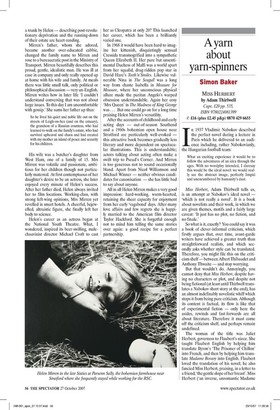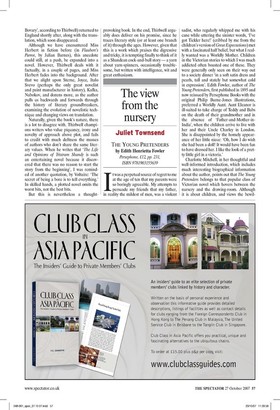A yarn about yarn-spinners
Simon Baker MISS HERBERT by Adam Thirlwell Cape, £20 pp. 535, ISBN 9780224081399 £16 (plus £2.45 p&p) 0870 429 6655 1 n 1937 Vladimir Nabokov described the perfect novel during a lecture in Paris which he delivered to an audience including, rather Nabokovianly, the Hungarian football team: What an exciting experience it would be to follow the adventures of an idea through the ages. With no wordplay intended, I daresay this would be the ideal novel: we would really see the abstract image, perfectly limpid and unencumbered by humanity's dust.
Miss Herbert, Adam Thirlwell tells us, is an attempt at Nabokov's ideal novel — 'which is not really a novel'. It is a book about novelists and their work, in which we are given themes, motifs and a fairly large caveat: 'It just has no plot, no fiction, and no finale.'
So what is it, exactly? You could say it was a book of clever-informal criticism, which firstly argues that, over time, avant-garde writers have achieved a greater truth than straightforward realists, and which secondly asks whether style can be translated. Therefore, you might file this on the criticism shelf — between Albert Thibaudet and Anthony Thwaite — and stop worrying.
But that wouldn't do. Annoyingly, you cannot deny that Miss Herbert, despite having no characters or plot, and despite not being fictional (at least until Thirlwell translates a Nabokov short story at the end), has an almost indefinably novelistic whiff which stops it from being pure criticism. Although its content is factual, its flow is like that of experimental fiction — only here the asides, rewinds and fast-forwards are all about literature. Therefore it must come off the criticism shelf, and perhaps remain undefined.
The woman of the title was Juliet Herbert, governess to Flaubert's niece. She taught Flaubert English by helping him translate Byron's 'The Prisoner of Chillon' into French, and then by helping him translate Madame Bovaly into English. Flaubert loved the translation of his novel; he also fancied Miss Herbert, praising, in a letter to a friend, 'the gentle slope of her breast'. Miss Herbert (an inverse, unromantic Madame Bovary', according to Thirlwell) returned to England shortly after, along with the translation, which soon disappeared.
Although we have encountered Miss Herbert in fiction before (in Flaubert's Parrot, by Julian Barnes), this anecdote could still, at a push, be expanded into a novel. However, Thirlwell deals with it factually, in a couple of pages, and Miss Herbert fades into the background. After that we alight upon Sterne, Joyce, Italo Svevo (perhaps the only great novelist and paint manufacturer in history), Kafka, Nabokov, and dozens more, as the author pulls us backwards and forwards through the history of literary groundbreakers, examining the evolution of novelistic technique and changing views on translation.
Naturally, given the book's nature, there is a lot to disagree with. Thirlwell champions writers who value piquancy, irony and novelty of approach above plot, and fails to credit with much deftness the masses of authors who don't share the same literary values. When he writes that 'The Life and Opinions of Tristram Shandy is such an entertaining novel because it discovered that there was no reason to start the story from the beginning', I was reminded of another quotation, by Voltaire: 'The secret of being a bore is to tell everything.' In skilled hands, a plotted novel omits the worst bits, not the best bits.
But this is nevertheless a thoughtprovoking book. In the end, Thirlwell arguably does deliver on his promise, since he traces literary style (or at least one branch of it) through the ages. However, given that this is a work which praises the digressive and tricky, it is tempting finally to think of it as a Shandean cock-and-bull story — a yarn about yarn-spinners, occasionally troublesome, but written with intelligence, wit and great enthusiasm.



































































 Previous page
Previous page